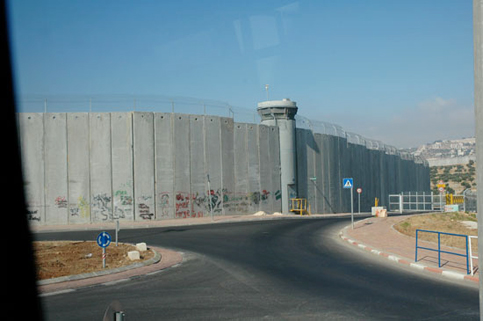Hour: Canada and Israel Building Apartheid
- Hour March 2010 by Stefan Christoff.

- Photo: Israeli apartheid wall cutting through Palestinian lands.
Yves Engler’s new book, Canada and Israel: Building Apartheid, is a stunning examination of the history of Canada-Israel relations and a key read for anyone interested in Canadian foreign policy of all political stripes.
Engler’s commitment to critiquing injustices linked to Canadian government and corporate policy is applied here to Canada-Israel relations and works within a broader critique of Canada’s national narrative as a force for peace in the world. He unravels the image of Canada as a broker of peace in the Middle East through well-researched details and outlines a historical thread that links successive Canadian governments to the suppression of Palestinian human rights and self-determination.
The book moves from a critical exposé on the current Conservative minority government’s Middle East policy to Canadian support for Israeli nationalist forces in the 1948 Middle East war, which led to Israel’s establishment and the displacement of hundreds of thousands of Palestinian refugees. Details on direct Canadian participation within Israeli military forces during the 1948 war are particularly striking and include an examination of figures such as Toronto’s Ben Dunkelman, who served in the Canadian Army in World War II and then in Israel Defense Forces during the 1948 Arab-Israeli War, becoming commander of the Israeli army’s 7th Brigade.
Often decorated as a war hero, according to Canada and Israel: Building Apartheid, Dunkelman commanded a brigade that “carried out atrocities in Safsaf, Saliha, Sa’sa and Jish,” all Arab villages then in Northern Palestine and now – since Palestinian inhabitants were expelled – is territory considered a part of Israel. In the village of Jish, for example, the book specifically describes the actions of the 7th Brigade from historical sources: “The [Dunkelman-led] army surrounded the village and carried out searches. In the course of the search, soldiers robbed several of the houses and stole 605 [British] pounds, jewellery and other valuables… When the people who were robbed insisted on being given receipts for their property, they were taken to a remote place and shot dead.”
Engler also writes about the dozens of Canadian pilots who joined the Israeli air force during the 1948 war. Government officials in Ottawa arranged “export permits to Palestine for numerous militarily useful items,” including the “idea of sending airplanes to a non-existent ‘Tel Aviv Spring Fair’ …created to justify exporting single-engine Harvard trainer monoplanes that were easily convertible to military uses.”
Canadian political icon and former prime minister Lester B. Pearson receives attention too: Often celebrated as a peacemaker, his position on key moments in Israeli/Palestinian history saw him staunchly defending colonial moves by the Israeli government. Pearson backed the Israeli move to secure control over the Palestinian lands in the West Bank and Gaza Strip after the war in 1967. He actively opposed moves within the UN to adopt resolutions calling on Israel to withdraw from occupied Palestinian territory, cornering Canada into an extreme minority while the majority of nations condemned Israeli occupation.
The book comes at a key moment since in recent years networks internationally have converged in support of the boycott, divestment and sanctions campaign, a global grassroots challenge to Israeli policies made stronger since the Israeli bombing of Gaza last winter, which took the lives of over 1,400 Palestinians.
Canada and Israel: Building Apartheid is a tightly packed educational book that presents a critical examination of Canada’s support for Israeli policies that continue to underwrite the basic human rights of the Palestinian people. As well, Engler encourages readers to rethink classic notions of Canada’s role in the Middle East and led this reader to question our own history as a country with a record of colonial dispossession of indigenous peoples, much like Israel.
Find more information on the book at www.fernwoodpublishing.ca


